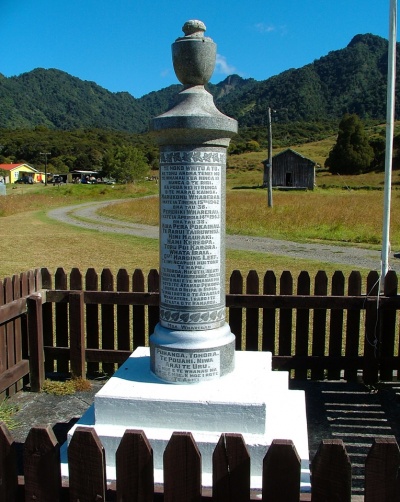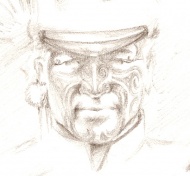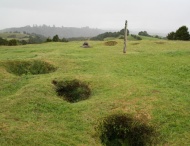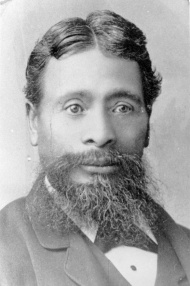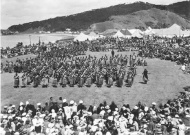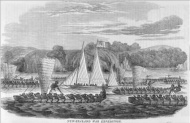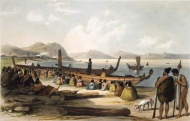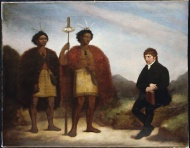Events In History
-
 7 March 1842First official execution in NZ
7 March 1842First official execution in NZ17-year-old Maketū Wharetōtara was hanged at the corner of Queen and Victoria streets in Auckland for the 1841 murder of Elizabeth Roberton, her two children, and two other adults. Read more...
-
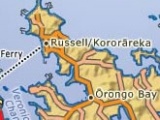 5 March 1830Outbreak of the Girls' War at Kororāreka
5 March 1830Outbreak of the Girls' War at KororārekaUruroa, the brother-in-law of Hongi Hika, responded to a rival who had cursed him and his Ngāi Tawake people after a fight between young women on the beach at Kororāreka. Many were killed in the conflict that followed. Read more...
-
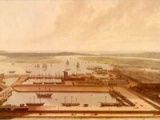 27 April 1806Moehanga becomes first Māori to visit England
27 April 1806Moehanga becomes first Māori to visit EnglandMoehanga (Ngāpuhi) became the first recorded Māori visitor to England when the Ferret berthed in London. Read more...
Articles
The Northern War

The Northern War, fought in the Bay of Islands in 1845-46, was the first serious challenge to the Crown in the years after the Treaty of Waitangi. Its opening shots marked the beginning of the wider North Island conflicts that are often referred to as the New Zealand Wars.
-
Page 2 – Origins of the Northern War
Actions by the colonial government cost Māori in the Bay of Islands in terms of lost trade and opportunities. Heke feared that chiefly authority was now subservient to that of
-
Page 3 – The sacking of Kororāreka
The sacking of Kororāreka shook the settler population. Over £50,000 worth of property was lost. In Auckland panic set in. Some settlers sold their land for whatever price they
Waitangi Day

Every year on 6 February, New Zealand marks the signing of the Treaty of Waitangi in 1840. For most people, Waitangi Day is a holiday; for many, and especially for Māori, it is a time for reflecting on the Treaty and its place in modern New Zealand.
- Page 2 - The first Waitangi DayGovernor-General Lord Bledisloe gifted the Treaty House and grounds at Waitangi to the nation in 1932. Two years later there were celebrations at Waitangi to mark the date of the
New Zealand's 19th-century wars

War changed the face of New Zealand in the 19th century. Tens of thousands of Māori died in the intertribal Musket Wars from the 1810s to the 1830s. There were fewer deaths during the New Zealand Wars (1840s-1870s) between Māori and the Crown, but the consequences were still dire for many tribes.
- Page 2 - Pre-1860 conflictsThe Musket Wars of the 1810s-1830s caused thousands of Māori to flee their traditional lands, freeing large areas for Pākehā (European) settlement. In 1840, Europeans bought
Musket Wars

Thousands of Māori died in the intertribal Musket Wars of the 1810s, 1820s and 1830s. Muskets changed the face of intertribal warfare, decimating some tribes and drastically altering the territorial boundaries of others.
-
Page 3 – Beginnings
The Ngāpuhi chief Hongi Hika is usually seen as responsible for beginning the Musket Wars.
-
Page 4 – The arms race
Diplomacy, arranged marriages, gifts, asset-stripping (taua muru) and escape were all used to avoid fighting. When these methods failed, the common response was to seek an
Go-betweens

An important feature of early cross-cultural contact in New Zealand was the role of intermediaries (kaiwhakarite) who acted as go-betweens – people from one culture who lived within the other culture and helped bridge the gap between the two.
-
Page 4 – The first woman settler?
Charlotte lived with a Ngāpuhi chief and refused to be 'rescued' on at least two occasions, before disappearing from the record.
The death penalty

The first execution in New Zealand was that of a young Maori named Maketu, convicted at Auckland in 1842. Walter Bolton became the last to be executed when he was hanged at Mount Eden prison in 1957. In total there were 83 verified executions for murder and one for treason in New Zealand between these dates.
- Page 2 - The first executionOn 7 March 1842 Maketu Wharetotara, the 17-year-old son of the Ngāpuhi chief Ruhe of Waimate, became the first person to be legally executed in New
Biographies
-
 Heke Pōkai, Hōne Wiremu
Heke Pōkai, Hōne Wiremu
Ngāpuhi chief Hōne Heke was an influential northern Māori voice in favour of the Treaty of Waitangi. However, he later became a leading opponent of British rule in New Zealand.
Read more... -
 Kawiti, Te Ruki
Kawiti, Te Ruki
A notable Ngāpuhi chief and warrior and a skilled military tactician who reluctantly signed the Treaty of Waitangi in 1840.
Read more... -
 Nene, Tāmati Wāka
Nene, Tāmati Wāka
Renowned Ngāpuhi chief, Tāmati Wāka Nene, was an early friend of Pākehā. He was one of its most influential supporters in the debate at Waitangi over the Treaty and he was among the first to sign.
Read more... -
 Ngāpua, Hōne Heke
Ngāpua, Hōne Heke
Hōne Heke Ngāpua was elected to Parliament in 1893 and represented the people of Northern Māori almost continuously until his death in 1909.
Read more... -
 Pomare
Pomare
Pōmare II was a prominent Ngāpuhi chief who signed the Treaty of Waitangi. He was later arrested by the British on suspicion of treason but released on the intervention of Tāmati Wāka Nene.
Read more... -
 Taiwhanga, Hirini Rawiri
Taiwhanga, Hirini Rawiri
Son of Rawiri Taiwhanga, Hirini Taiwhanga petitioned Queen Victoria to change the laws that breached the Treaty of Waitangi.
Read more... -
Taonui, Aperahama
Aperahama Taonui, of the Te Popoto sub-tribe of Ngāpuhi, was a founding member of the Kotahitanga movement, which evolved into the Māori parliaments of the 1890s.
Read more... -
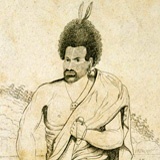 Te Pahi
Te Pahi
Ngāpuhi chief Te Pahi was the first influential Māori leader to have significant contact with British colonial officers.
Read more... -
 Henare, James Clendon Tau
Henare, James Clendon Tau
James Henare was Ngā Puhi leader, soldier, farmer, and community leader. After the Second World War he helped set up the kōhanga reo programme and fought for recognition of Māori rights under the Treaty of Waitangi.
Read more... -
 Moka Te Kainga-mataa
Moka Te Kainga-mataa
A Nga Puhi leader, Moka Te Kainga-mataa was an original signatory of the 1835 Declaration of Independence. Moka's name – but not his signature – also appears on the 1840 Treaty of Waitangi
Read more... -
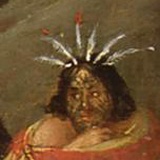 Hika, Hongi
Hika, Hongi
The Ngāpuhi rangatira Hongi Hika became a pivotal figure in New Zealand history. He was a skilled and driven leader in war and trade, and his actions had far-reaching consequences.
Read more...
Related keywords
- waima
- maori battalion
- pomare II
- musket wars
- bay of islands
- moka te kainga-mataa
- treaty of waitangi
- ruapekapeka attack
- northern war
- george grey
- te ruki kawiti
- historic places
- waikato
- hongi hika
- crime
- death penalty
- kororareka
- samuel marsden
- maori
- moehanga
- hirini taiwhanga
- maori leaders
- te reo māori
- aperahama taonui
- treaty signatories
- te pahi
- whangaroa
- boyd incident
- te rarawa
- ngati whatua
- ngati kuri
- te aupouri
- james henare
- rangihoua
- ruatara
- intermediaries
- pre-1840 contact
- australia
- charlotte badger
- land claims
- Maori MPs
- MPs
- kotahitanga
- hone heke ngapua
- ngati kura
- waitangi day
- hone heke
- kupapa
- tamati waka nene
- hms hazard
- 1840s
- NZ Wars memorial
- waitangi
- centennial
- maketu
- painting
- joseph merrett
- augustus earle
- maps
- thomas kendall
- muskets
- new zealand wars
- missionaries
- punishment
- elizabeth pulman
- photography
- charles bledisloe
- treaty house
- henry williams
-
Main image: Waimā war memorial
This memorial at Waimā, near Rāwene, lists men from the district who died in the Second World War.

